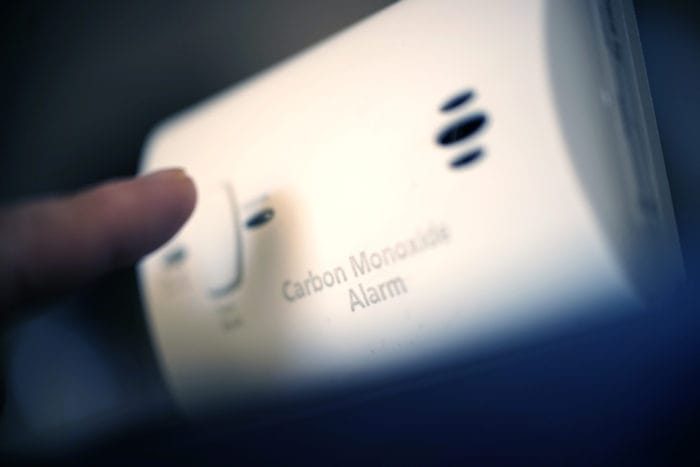This might be the most important article you ever read.
Seriously.
How much does a battery cost? A couple of dollars, maximum? But how much is that battery worth? What would you say if you were told that your life hinged on whether you bought that battery? If that has caught your attention… Good.
Checking your carbon monoxide alarm to see if it’s working takes no time at all. Still, the consequences if it isn’t working are serious. Today we’ll take a good look at whether it’s time to test your carbon monoxide alarm.
What is Carbon Monoxide?
Carbon Monoxide is a gas that is created by combustion. If you heat your home using gas, wood, coal, propane, or oil, you are creating Carbon Monoxide. Cars also produce carbon monoxide when they burn gasoline.
On a molecular level, Carbon Monoxide (also called CO) is one carbon atom and one oxygen atom. It is dangerous as it binds to red blood cells. It takes up space in your blood that would normally be used to carry oxygen. Also, it is odorless and tasteless.
You could be in a room full of carbon monoxide and be completely unaware of its existence.
That’s the reason it’s often called the invisible killer…
What is Carbon Monoxide Poisoning?
Essentially Carbon monoxide causes slow suffocation by depriving the brain of oxygen. The symptoms are wide and varied. They include things such as: –
- Headaches
- Coordination problems
- Nausea
- Vision problems
- Chest pain
- Confusion and decline in cognitive function
Carbon monoxide poisoning can be deadly. Perhaps the biggest threat is that, given enough exposure, it can reduce cognitive function to the point that the victim doesn’t realize that they are in real danger of being poisoned.
Want to see a perfect example of this? This article makes for an interesting (and frightening) read.
Phantom post-it notes? Nope, a cut and dried case of CO poisoning!
By ensuring that they had a working carbon monoxide detector, the individual in the above article was able to identify excessive CO and take the appropriate action!
How Do Carbon Monoxide Detectors Work?
There are three general sensor types. While they all provide the same solution, an alarm if excess carbon monoxide is detected, they work in a slightly different way:
- Electrochemical carbon monoxide detectors: There is a chemical solution inside the sensor that changes in conductivity if brought into contact with CO. When the current changes, this triggers an alarm.
- Biomimetic carbon monoxide sensors: This is a simple system where a colored gel will change in appearance with carbon monoxide exposure. This color change triggers an alarm.
- Metal Oxide sensors: A silica chip can sense carbon monoxide. It changes the resistance in an electrical circuit that will trigger an alarm.
When Do CO Alarms Go off?
This can vary from model to model. Sensitive models can trigger as low as 50 parts per million (ppm). Others may not go off until they reach a higher threshold. The speed at which an alarm will sound is dictated by the rate at which carbon monoxide builds up.
How Long Do Carbon Monoxide Detectors Last?
Carbon monoxide detectors do not last forever. It is recommended that they are replaced before seven years have elapsed.
In all of the above examples, components break down, become corroded, and are generally less efficient.
When you consider the cost of either replacing an alarm or having it checked over by a professional, against the consequences if you don’t, it makes complete sense!
How Do I Test and Maintain a Carbon Monoxide Alarm?
If you are unsure of whether your CO alarm needs maintenance, the decision is easy.
If there is doubt, then there is no doubt.
Suppose you are unsure of how to check your alarm.
In that case, it is always a worthy use of time and resources to employ a professional who will be able to make a quick and accurate assessment of what you need to do.
Here are some general guidelines as to how to maintain a carbon monoxide detector so that you have peace of mind and confidence that it is working:
-
Test your Carbon Monoxide Alarm Frequently
Most electrical carbon monoxide detectors come with a ‘push to test’ button. On pressing the button, you should hear a loud alarm.
If you don’t, this means that you have no obvious way of seeing if CO is present. You should perform this check once a month.
-
Replace the Batteries
The frequency with which you replace your batteries depends on the model and type.
That said, if it has been a while since you last thought about it, why not replace them now? As we said at the start, your safety has got to be worth a few dollars, right?
-
Check Connections
Many CO alarms are powered by the mains with a battery backup. While it is unlikely that both won’t work, it still pays to check.
Dealing with mains electricity (especially when connected to a vital piece of safety equipment) might be a job that you want to leave to the professionals!
-
Replace the Sensor Entirely
You might discover that your carbon monoxide detector is old or, on inspection, can’t be sure of its efficiency. If that’s the case, just replace the unit completely.
If you are unsure about which model is suitable or the most appropriate location, contacting a professional safety company can give you complete confidence that you are protected against the dangers of carbon monoxide.
Conclusion
If you ask yourself, is it time to time to test your carbon monoxide alarm?… The answer is, more than likely, yes. Carbon monoxide is highly dangerous and insidious. You have absolutely nothing to lose by checking and testing your alarm. If it isn’t working to the required standard, consider employing professional help to ensure you are covered.

